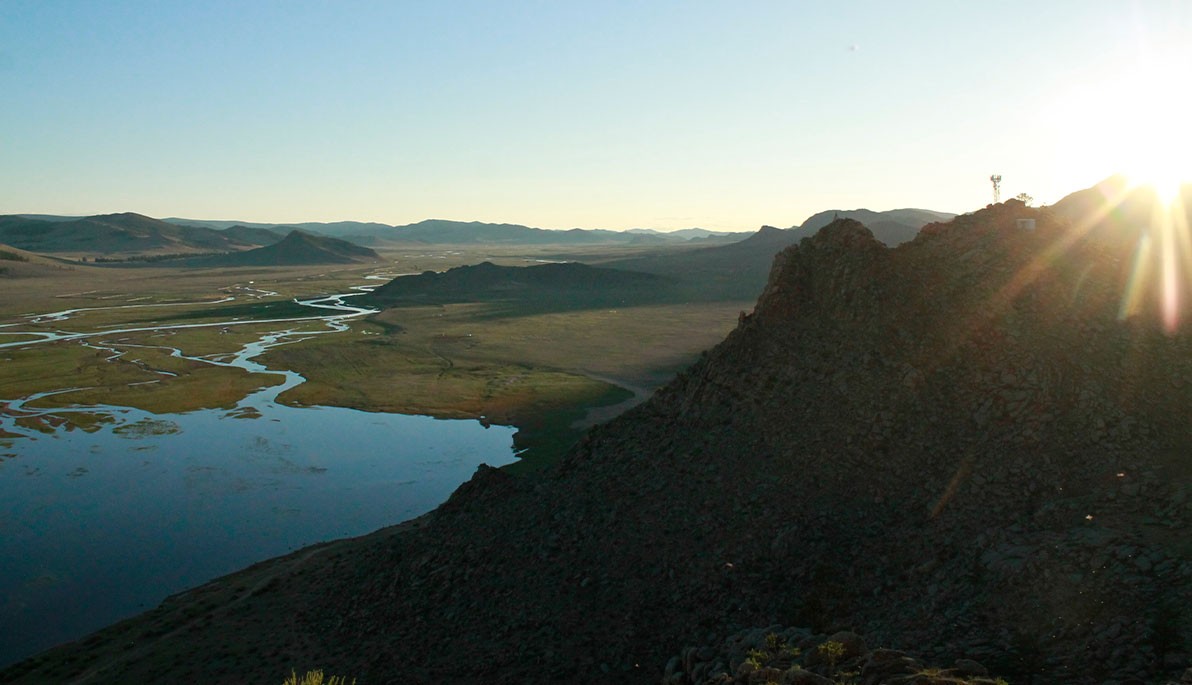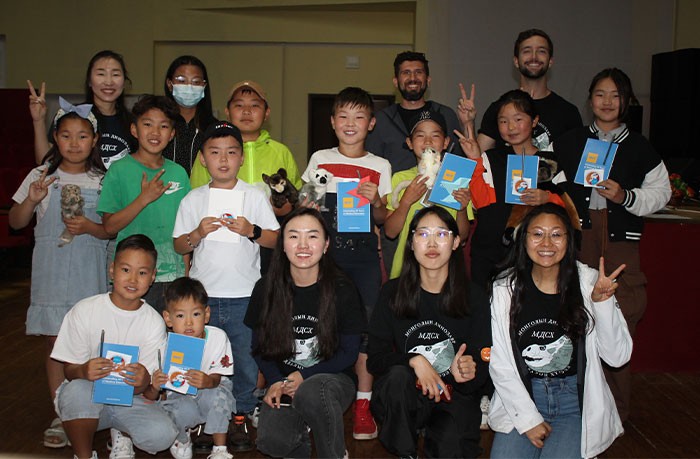
Guiliano Global Fellows: Studying Grip Strength in Mongolia
October 17, 2023
Throughout each year, a handful of New York Tech students are selected to complete academic research projects at least 200 miles away from their campus through the Edward Guiliano Global Fellowship Program. Since 2014, more than 170 students have had the opportunity to engage in this experiential-based learning that merges academics and culture.
This spring, College of Osteopathic Medicine (NYITCOM) students Melody Young and Noah Chernik were awarded a grant under the fellowship program and traveled in August to Mongolia to perform research and teach middle school students about biomechanics. Young is no stranger to the fellowship program—she has traveled twice before under the grant to Costa Rica and North Carolina, where she studied three-toes sloths and collected grip force data from lemurs, respectively.
Alongside Assistant Professor of Anatomy Michael Granatosky, Ph.D., Young and Chernik’s project Across the Pacific: STEM Initiative in Mongolia brought their well-established Are You Stronger Than a Lemur outreach program to the young students overseas, where it became a successful international educational program.
Supported by a grant from the Leakey Foundation, Are You Stronger Than a Lemur was established in October 2022 as an interactive grip strength activity for K-12 grade students. The exercise is twofold: children learn about the origins of human biomechanics while novel data on human development and gripping performance is collected.
In Mongolia, Young and Chernik had students take a six-question quiz covering topics of biomechanics, muscle physiology, statistics, primatology, and human evolution. A presentation followed, with the budding physicians explaining why they chose to study lemurs as a way to understand grip force in the context of human evolution.
Students then became scientists as they used a dynamometer—a device used to measure force—to discover their own grip strength. Data was plotted on a board, and their grip force was compared to lemurs, fellow students, and data from American students. After guiding the children through interpreting their recorded data, they retook the quiz from the beginning of the lesson to assess what they had learned through the experiment.
“I hope our participating students realize that science doesn’t have to be hard, boring, or out of their realm,” Young says. “Are You Stronger Than a Lemur is so special because it turns people who may have never had any interest in science into citizens who are now actively participating in the scientific process. It takes an evolutionary/biomechanical question that we are interested about in the lab and makes it relevant to every single person who takes part in it.”

NYITCOM students Melody Young (bottom row, far right) and Noah Chernik (back row, second from right) traveled with Assistant Professor Michael Granatosky (back row, third from right) to bring their project Are You Stronger Than a Lemur outreach program to young students in Mongolia, where it became a successful international educational program.
By the end of their time with the middle schoolers, Young and Chernik had collected two sets of data: An assessment of whether their program had objectively taught the students core topics of biomechanics and the actual grip force data they collected using the dynamometers. Chernik believes that, from their preliminary data analysis, they were successful in teaching about science and the greater field of STEM.
In addition to teaching students in Mongolia about grip strength and the scientific method, Young and Chernik also established a pen pal program between NYITCOM students and Mongolian middle schoolers. At New York Tech, the duo runs an existing pen pal program, where they connect medical students to middle schoolers in New York and Arkansas. Now, the program has gone international.
“This trip was humbling and gave me the opportunity to interact with a people and culture I had no previous experience with,” Young says about her time in Mongolia. “We were able to visit traditional nomadic homes—gers—and the people inside; their instinct was always to share and to give. The people of Mongolia helped me feel as though I had a family right there.”
“Our time in Mongolia allowed me to grow tremendously,” adds Chernik. “Experiencing the nomadic lifestyle was eye-opening and allowed me to reflect on my own practices and values. The students’ excitement for the program and learning was unlike anything I have ever seen.”
During their time there, Young and Chernik had no knowledge of Mongolian—a language that, while using the Russian alphabet, is completely one of its own. The pair traveled with two Mongolian college students and an educator, who helped them overcome cultural and language barriers and, Chernik says, exposed them to all the country had to offer while making them feel at home.
“With a well-planned and meaningful application, you have a real chance to have a once-in-a-lifetime experience without the financial hardships,” Chernik says of the unique opportunities afforded to students through the fellowship program. “Pick a passion or interest that you would like to pursue, and then plan your application around that main purpose. It is truly an incredible experience and a chance to perform unique and memorable work.”
The next cohort of students selected for the Edward Guiliano Global Fellowship will complete their projects between December 2023 and May 2024. Learn more and apply. Applications due by November 14.
More Features

An Alumnus’ Commitment to the Environment
As an energy management graduate from New York Tech’s Vancouver campus, Jasdeep Gulati (M.S. ’22) is highly invested in educating people about environmental and climate sustainability.

Vancouver Faculty Win University-Sponsored Research Awards in New Program
The new Global Impact Research Grant (GIRG) program has been developed to keep Vancouver-based faculty connected to faculty and research projects being conducted on the university’s New York campuses.

Studying Climate Change One Degree at a Time
Junhua Qu (M.S. ’24) began her collegiate journey in Beijing. But, her interest in climate change took her to New York Tech’s Vancouver campus to study energy management.
